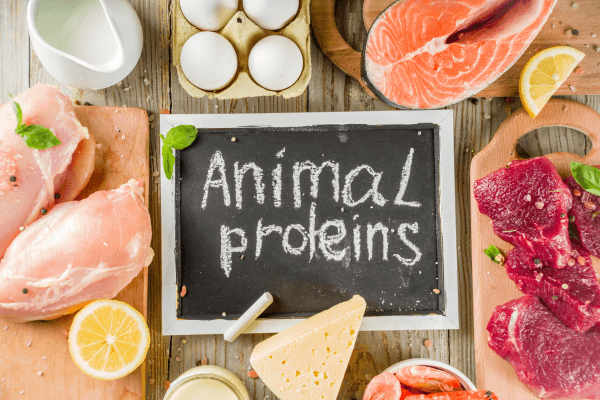Protein is one of three main macronutrients obtained through plant and animal sources. Plant protein sources include pulses, legumes, tofu, and whole grains whereas animal sources include eggs, poultry, meat, and fish. We also have animal-derived products like milk and milk by-products.
The relationship between animal protein and insulin resistance is complex.
In this blog, we will learn if animal protein is one of the causative factors for insulin resistance.
Animal protein
Food proteins play an important role in the human body. Proteins serve as building blocks, structural support, cellular death initiators, biochemical catalysts, and pH maintainers. Protein can be obtained through animal source and plant sources.
Beef, pork, eggs, fish, and poultry are examples of animal sources. Since it includes all nine essential amino acids, it is also known as a complete protein.
Consuming animal protein has positive effects like:
- Lowers the risk of developing type diabetes.
- Lowers the risk of developing heart diseases.
- Lowers the risk of developing cancer.
- Helps in weight management.
Insulin resistance
A condition where the body cells become resistant to the insulin. The body’s muscle, fat, and liver cells don’t react properly to the insulin that the pancreas produces. Because of this, the glucose levels are not regulated properly in the body or the glucose is absorbed properly in the body. This could be either short-term or long-term, depending on the treatment plan.
Insulin resistance is linked with:
- Obesity
- Cardiovascular disease
- Non-alcoholic fatty liver
- Metabolic syndrome
- Polycystic ovary syndrome
Increased insulin levels or hyperinsulinaemia has some effects on the body:
- Weight gain
- Increased triglycerides levels
- The buildup of plaque in the arteries
- High blood pressure
- Cardiovascular disease
- Stroke
- Type 2 diabetes
Some may experience symptoms like darkening of the armpit and back of the neck, skin tags and changes in vision.
To answer the question: Does animal protein cause insulin resistance?
Yes, studies show that consumption of animal protein, especially red meat, increases insulin resistance.
Red meat is high in saturated fat. Insulin resistance is increased by fatty red meat cuts.
When animal protein is cooked at high temperatures, advanced glycation end products are formed. This increases inflammation and oxidative stress, which may lead to insulin resistance when consumed in excess.
Meat when ultra-processed showed a link to insulin resistance. Processed products have preservatives in them, which may impact metabolic health. Different cooking methods also have an impact on insulin sensitivity.
Saturated fat activates toll-like receptors. It causes pro-inflammatory cytokines to be released.
Excessive saturated fat accumulates in non-adipose tissues. It creates toxic lipid intermediates like Diacylglycerols and ceramides. These intermediates activate protein kinase C. Protein inhibits insulin receptors substrate-1.
Saturated fat triggers endoplasmic reticulum stress. It activates unfolded protein response and disrupts insulin signalling pathways. It leads to inflammation.
A prospective investigation study showed that high animal protein diets have an increased risk of developing diabetes.
So, does this mean we should stop having animal protein? No, you can have lean-cut meat like chicken, fish and egg whites. They contain low to no saturated fat and are a good source of high-biological value protein.
The type, preparation, and quality of protein sources seem to have a greater impact on the association between insulin resistance and animal protein than does animal protein per se. A balanced approach, focusing on lean sources and healthy preparation methods is more beneficial for metabolic health.
Kripa N,
Senior Clinical Dietitian, Simplyweight





